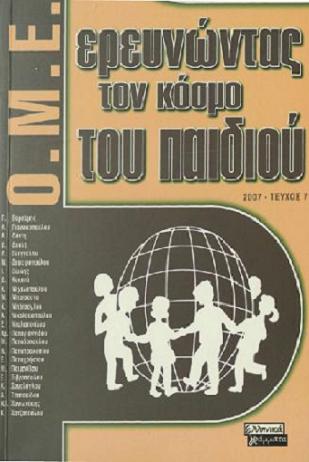Ομάδες Μικτής Ηλικίας: Προκαταρκτική προσέγγιση

Abstract
Mixed-age groups consist of children with heterogeneous abilities and an age difference more than a year. These groups lead teachers to the avoidance of one-track programs which force all children to engage in the same activity at a given moment. Due to the fact that research has shown that mixed-age classes are likely to support social development, to enrich emotional development and to encourage intellectual development, we have endeavored to investigate the views of Greek primary school teachers and kindergarten teachers on this particular pedagogical strategy. The research is composed essentially of three interactive parts. It begins with the theoretical discussion regarding mixed-age groups, followed by the investigation, by means of a questionnaire, of the views of 320 primary school teachers and 320 kindergarten teachers from the prefectures of Thessaloniki, Kilkis, Drama, Fiorina, Kastoria and Chalkidiki. The research concludes with the interpretative analysis out of which it is deduced that primary school teachers and kindergarten teachers know very few things about mixedage groups.
Article Details
- How to Cite
-
Σιβροπούλου (Irini Sivropoulou) Ε., & Ευαγγέλου (Dimitra Evagelou) Δ. (2007). Ομάδες Μικτής Ηλικίας: Προκαταρκτική προσέγγιση. Investigating the child’s World, 7, 178–194. https://doi.org/10.12681/icw.18230
- Issue
- Vol. 7 (2007)
- Section
- Scientific articles & educational projects

This work is licensed under a Creative Commons Attribution-NonCommercial 4.0 International License.
Authors who publish with this journal agree to the following terms:
· Authors retain copyright and grant the journal right of first publication with the work simultaneously licensed under a Creative Commons Attribution Non-Commercial License that allows others to share the work with an acknowledgement of the work's authorship and initial publication in this journal.
· Authors are able to enter into separate, additional contractual arrangements for the non-exclusive distribution of the journal's published version of the work (e.g. post it to an institutional repository or publish it in a book), with an acknowledgement of its initial publication in this journal.
· Authors are permitted and encouraged to post their work online (preferably in institutional repositories or on their website) prior to and during the submission process, as it can lead to productive exchanges, as well as earlier and greater citation of published work.


